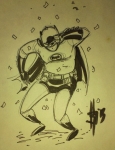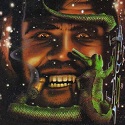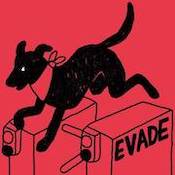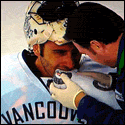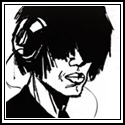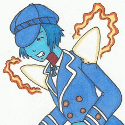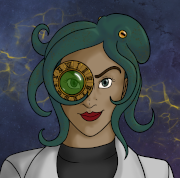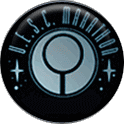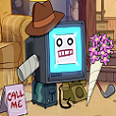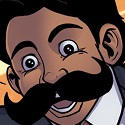|
Beantown posted:Does anyone here ever have to deal with "writing anxiety"?
|
|
|
|

|
| # ? May 9, 2024 10:14 |
|
Beantown posted:Does anyone here ever have to deal with "writing anxiety"? No I am a cool dude about it all of the time. Do you have a story you want to tell? Like it's just itching to get out there? If not, try to put those ideas into one sentence. One central conflict. I'm working on one right now, and I have all sorts of characters and notes and snippets of ideas for it. But in my case, I can boil it down to: "A girl is transported to another world, and learns that she must save her own universe from nightmarish creatures beyond her understanding." And then I have all sorts of neat world-building things that make it not the same as every other story with that basic plot. So get your really big, vague conflict sorted out. Then pick a moment in time; maybe it's when the character first encounters the conflict, maybe it's some inciting event that disrupts their lives and forces them into a greater conflict. Just pick something that gets them moving. Then set a clock, or a pick a time to start, or whatever, and write for 15, 20, 30 minutes. Or however long. Whatever time frame you pick, keep writing for that duration and don't stop or edit yourself. When you hit the end, go back and clean it up enough to post it in the Fiction Farm. Then post it in the Fiction Farm. People will give you feedback, and then demand more writing for the writing god. Or join Thunderdome.
|
|
|
|
Beantown posted:Does anyone here ever have to deal with "writing anxiety"? Go someplace away from distractions, but yet feels comfortable. If you're still therapying, then try it when you come out of a session. Note- if you want honest critique, you will still need to have something cogent, even if it is bad, and be ready to look over it again once others look at it.
|
|
|
|
Phil Moscowitz posted:Read a book. This sort of advice frequently gets handed out around here, often with some measure of derision. I'm not sure if it's entirely helpful. Yes it is necessary that one reads plenty of books from various genres, but more emphasise needs to be placed on the importance of critical reading skills.
|
|
|
|
I meant it seriously. Whenever I feel a minor block like that, I read a new book. Reading is like a jump start motivator to write: what I like in the writing, how I would write a scene differently than the author, what works, what doesn't. So I should have put all that but I thought it was self evident.
|
|
|
|
theworstname posted:This sort of advice frequently gets handed out around here, often with some measure of derision. I'm not sure if it's entirely helpful. When I've focused on reading to pick up on the techniques being used, close readings etc, it takes me so long to finish a book that I lose interest and put it down. I've been wondering though about how others use reading to improve their writing. I tend to improve even reading through enjoyment and occasionally finding a paragraph that hits me hard, but are other people seeing a lot of improvement in their work through a lot of close reading?
|
|
|
|
My suggestion for new-timers when it comes to hearing people say "just read (a book)" is to do this: Read something purely as a reader - forget the critical, analytic writer part of your brain. Just read it. Hopefully it's something you'll enjoy. Now, when you hit a part of the story that you really enjoy, that's when you stop and ask yourself, "Why did I enjoy that part so much? What made that one part work?" That's when you do some reverse engineering. Maybe it was how the author introduced their characters and/or plot points (rate of revelation is a great tool to work with). Maybe it was the way they structured the chapter/story. Maybe it was something surprising said or done by an interesting character. You always want to have one eye open when reading for sentence-level stuff (grammar, diction, structure) that you can poach or build from for your stuff, but don't worry about allowing yourself to get lost in someone else's writing; you have to experience what strong fiction can do to a person almost as a reminder, a refresher.
|
|
|
|
theworstname posted:This sort of advice frequently gets handed out around here, often with some measure of derision. I'm not sure if it's entirely helpful. Writing is a very weird art form. People who do read a whole lot often are terrible writers. While some people write so much that they often don't have time to read (although these people are often lying) and get published regularly. Now, the trouble with the advice "read a book" is that the person telling you that has no idea what your writing and trying to accomplish within the art of writing. A better question that will then lead to useful "read a book" advice is "What are you writing?" So you want to write Speculative fiction/Science Fiction? Ok "try reading X books and Y books to get a better understanding of the genre" OR, so you want to write literary fiction that's enigmatic and thick? "Start reading post WWI modernists and this other stuff." basically it comes down to communication when addressing that question. But then you come to the actual act of reading you can't approach it in the same way you learned in school. "Critical reading skills" as taught to you in school is academic bullshit that's entirely incompatible with writing a piece of fiction. It's all well and good that you can break down every metaphor and image system in T.S. Eliot's The Wasteland but it's just drudgery. You don't really get to enjoy the poem or it's thousand nuances if you're going at it with a scalpel. So when someone says "read a book" you have to read it from a pure reader perspective rather than a literary dissector. I.E. "Was the plot good?" "Were the characters real?" "Was the language clear?" are the kind of deceptively simple questions you have to ask yourself as you read. Because when you're actually writing you'll be able to assess as a reader if you had a good plot, or a real characters, or clear language. This is all subjective though. It comes down to your sense of taste not coinciding with your ability to reach that sense of taste. This is why you end up writing millions of words of crap before honing it to the point where it coincides with what you like to read. It's not easy. Which comes back to my first point. Read Specifically don't eschew stuff outside of what you need to read to improve your writing but make sure your breadth of knowledge within whatever your writing is robust.
|
|
|
|
Do y'all have any advice for any honest to god new writers? I got it into my head to learn some basic fiction writing (I'm a fine nonfiction writer) but as soon as I actually sat down to try and write I froze up with anxiety and insecurity and ignorance. I don't even know where to start. Any suggestions?
|
|
|
|
Jinnigan posted:Do y'all have any advice for any honest to god new writers? I got it into my head to learn some basic fiction writing (I'm a fine nonfiction writer) but as soon as I actually sat down to try and write I froze up with anxiety and insecurity and ignorance. I don't even know where to start. Any suggestions? I'm going to beat the seasoned writers to the punch and say it: Join Thunderdome. I was in your exact situation three Thunderdomes ago. You get lots of feedback, good prompts, and solid deadlines. Signups are still open for this week, too! SpaceGodzilla fucked around with this message at 03:26 on Apr 4, 2013 |
|
|
|
Jinnigan posted:Do y'all have any advice for any honest to god new writers? I got it into my head to learn some basic fiction writing (I'm a fine nonfiction writer) but as soon as I actually sat down to try and write I froze up with anxiety and insecurity and ignorance. I don't even know where to start. Any suggestions? I'm assuming you already know how to ignore the inner editor during the first draft. Just remember that it doesn't have to be perfect on the first try. I'm likely wrong, but I don't really see much difference between nonfiction writing and fiction writing, except that in the latter you get to make things up.
|
|
|
|
CantDecideOnAName posted:I'm assuming you already know how to ignore the inner editor during the first draft. Just remember that it doesn't have to be perfect on the first try. I'm likely wrong, but I don't really see much difference between nonfiction writing and fiction writing, except that in the latter you get to make things up. They obviously don't know how to ignore that inner editor or they probably wouldn't be paralyzed by anxiety. And Thunderdome, while awesome, amazing, the best, and something every goddamn budding writer who stumbles in here should do until their brain bleeds, isn't a magical cure-all for that anxiety. I've participated in several Thunderdomes, plunked out of two, and still have that fear. That said, the best advice remains: write anyway. Write a lot. Write poo poo. Promise yourself you will write poo poo. Force yourself to write poo poo. Get over yourself and your ideals and let yourself write something no matter how bad it is. Do it again and again. Be brave and subject it to criticism. Accept the criticism (it's okay if you get mad or want to cry for a while--for some reason getting your writing criticized sometimes feels like people are criticizing your very existence, but you get over that with practice.) Learn from the criticism. Then, write again. It might not feel easier than the first time. Promise yourself you will write more poo poo. Force yourself to write more poo poo. Keep writing poo poo; do it again and again.
|
|
|
|
Tell me about writing an intentionally unlikable protagonist. Not uninteresting, just not the knight in armor chasing a cause. In my story, poo poo happens, and she has to change or die, or both. How much time do I get before that poo poo has to happen? I want to establish: - late 30s female, kind of attractive but not OMG HAWT - cusses, lazy. - no ambition beyond getting out of work to get to the bar - drugs and booze yes please. - a bar fly that ain't exactly a prude Basically - imagine the two main characters of "John Dies At The End" - but they're but 37 year old women instead - but still talk and act like that. Is that too far a stretch? edited edits: More information. I wrote the story. Hell yeah I wrote it, and I'd have gotten away with it too. However, now I'm doing revisions, and sharing the first few chapters, and some people - just some - are asking me who's my intended audience with this book? If I'm going to write about a brash bar-hopping sailor talking floozy, I should skew the characters to twenty-somethings because darn it women in their 30s just don't act like this. Obviously, I disagree -- BUT I'm wondering how big of a gently caress should I give about that when the story isn't so much about the 30-something woman who cusses as it is about the aliens taking over our planet by burrowing into our skulls. But if I can't get readers to give a poo poo, they'll never get to the aliens. But dammit, the thought of me, a 48 yr old male, writing about a 21 yr old female makes me cringe. A lot. magnificent7 fucked around with this message at 07:32 on Apr 4, 2013 |
|
|
|
magnificent7 posted:More information. I wrote the story. Hell yeah I wrote it, and I'd have gotten away with it too. However, now I'm doing revisions, and sharing the first few chapters, and some people - just some - are asking me who's my intended audience with this book? If I'm going to write about a brash bar-hopping sailor talking floozy, I should skew the characters to twenty-somethings because darn it women in their 30s just don't act like this. Obviously, I disagree -- BUT I'm wondering how big of a gently caress should I give about that when the story isn't so much about the 30-something woman who cusses as it is about the aliens taking over our planet by burrowing into our skulls. People of any gender and age can and do act like anything, including late 30s female hard drinkin', hard cussin' hussies. The only thing I can imagine that would have her age read "wrong" is if you throw in a lot of irreverent banter and cultural references that are more suited to the early-mid 20s crowd -- it's going to be a stretch if you have her making Aqua Teen Hunger Force jokes. Experience also suggests age. Even if this woman has no ambitions, she's still been an adult for 20 years and has seen some poo poo. Letting that inform her behavior will go a long way in making the audience respect a character that they don't necessary like, something that will be lost if you make your protagonist a 21 year old moron.
|
|
|
|
magnificent7 posted:But if I can't get readers to give a poo poo, they'll never get to the aliens. But dammit, the thought of me, a 48 yr old male, writing about a 21 yr old female makes me cringe. A lot. Definitely know that feeling. I'm 30 but my protagonist is a tough-as-nails 24 year old alcoholic woman who also cusses a lot and has a lot of flaws-- and sounds a lot like your protagonist. I'll admit that you got me intrigued just by what you described about your story! Way too many authors (male and female) reserve the 'flawed badass' archetype for yet another bland han solo-esque male character and frankly i'm sick of seeing that poo poo. My advice to you is to give the reader subtextual glimpses into your lady's demons, early on. Show the reader that, just below the surface, this woman is struggling-- even as she puts on her best tough face. The best heroes are sympathetic for this reason, no matter how tough they may seem. And maybe try adding some weird alien-forshadowing poo poo to the opening scene, like they try to take over her brain or something but can't because there's too much alcohol and coke in her blood! 
|
|
|
|
Jinnigan posted:Do y'all have any advice for any honest to god new writers? I got it into my head to learn some basic fiction writing (I'm a fine nonfiction writer) but as soon as I actually sat down to try and write I froze up with anxiety and insecurity and ignorance. I don't even know where to start. Any suggestions? In accordance with the advice given by earlier poster, I would also recommend reading On Writing by Stephen King. There are hundreds of books on writing, but I'll still jump back in and read relevant passages if I find myself stuck on a draft or edit or something. It's quick, simple, and offers a very personal insight into the world of writing that you don't get with the more "instructional" books. While there's a lot of useful knowledge to gain, I think the biggest thing the book accomplishes is building an excitement to writing (at least, it does for me). You should never look at writing as a chore of course, but sometimes your enthusiasm can wane, and it's those moments where this book comes the most in handy for me.
|
|
|
Jinnigan posted:Do y'all have any advice for any honest to god new writers? I got it into my head to learn some basic fiction writing (I'm a fine nonfiction writer) but as soon as I actually sat down to try and write I froze up with anxiety and insecurity and ignorance. I don't even know where to start. Any suggestions? On Writing is fantastic, and The 10% Solution by Ken Rand is essential. While it won't help you to actually write a good story, using it will make anything you write more readable. When you plonk your horrid poo poo down in this forum, we'll be much more willing to help you if you've gone through Rand's process. Also; join Thunderdome.
|
|
|
|
|
magnificent7 posted:Tell me about writing an intentionally unlikable protagonist. Not uninteresting, just not the knight in armor chasing a cause. Kind of like the chick in this? I don't feel like that type of character is at all uncommon.
|
|
|
|
Mr. Belding posted:Kind of like the chick in this? I don't feel like that type of character is at all uncommon. And the foreshadowing is there, the aliens are there. The people who've got problems with the character have said flat out, "but I'm still roped in because of the creepy aliens and that fact that you start the book by saying she's already dead." Thanks for the input y'all. I don't feel so far off on this after all. magnificent7 fucked around with this message at 18:15 on Apr 4, 2013 |
|
|
|
There was a discussion in my American lit. class today about whether "good writing" can be taught (as in through creative writing courses) or whether trying to teach it just squeezes the creativity out of the process. I'd love to hear some opinions on this. And probably a long shot, but are there are any articles / opinion pieces written on the subject worth reading?
|
|
|
|
Art cannot be taught. Craft, on the other hand, can. Many badly written books are loved and admired by people all around the world because the meaning of the story/message is captivating, for whatever reason that may be. That has little, if anything, to do with craft above a baseline level of competence. It's not a popular opinion but I really do believe you can teach craft all day long, and get anyone to be a "good writer" but that doesn't mean that anyone will care about what they've read. (in terms of fiction, anyway) That's the art part, which is far more difficult to nail down and instill into someone. People tend to fall into two groups: those who understand human interaction well enough to create captivating stories, and those who simply don't. That's not to say there's no use for good writers who understand only craft. Everyone should be taught how to write well. Everyone should be taught the use and abuse of rhetoric and conveying ideas in a captivating way. Those are the kinds of skills that would serve everyone irrespective of what they end up doing with their lives.
|
|
|
|
Chillmatic posted:Art cannot be taught. Craft, on the other hand, can. Totally agree with all this. I'll go on to add that I don't think traits like creativity, curiosity, and enthusiasm can be taught, but they can be learned. Having the resources in place for people who are willing and able to learn these things is a worthwhile environment.
|
|
|
|
I feel like often my writing is too literal. (Possibly because I do a lot of academic writing for college.) What's a good way for someone to break out of literal-minded writing? When I try to write more abstractly, I feel like I'm just covering my literal thoughts with an unconvincing abstract veneer. e: fixed mixed metaphor
|
|
|
|
What do you mean your writing is "too literal?" Please give an example or clarify, because that's very vague and could mean a number of things.
|
|
|
|
Apologies for not being clear. I feel like while I'm okay with writing descriptive prose on a basic, gets-across-the-idea level, I'm not as good with working in more figurative and less literal terms. When I read other stories, I'll see creative phrases that I like, but with my own writing, it feels as if it lacks that eloquence, like I'm more cinematic in my writing style than literary. For instance, a line I read like "The Monster twitched its jeweller's hands down to fondle at the men, to twist them in half, to crush them like berries, to cram them into its teeth and its screaming throat," hits me as a nice piece of prose, but if it was something I'd written, it'd be more like "The T-rex reached forward, as if it wanted to grab them, to tear them apart between its fangs and claws," or something similarly plain.
|
|
|
|
Ah, gotcha. So what you mean is, you're not good at using similes and metaphors to describe something. Abstract really isn't the word for that, that probably threw me off more than "literal." Learning to be good at that is tough, it's something that comes with lots of reading and remembering what you read. Find a few authors who are great at it and read them over and over. Don't copy them, just try to emulate them while adding your own flavor. Don't be afraid to go off the rails a bit. If you have good beta readers or post in the Farm or a dedicated thread or Thunderdome (  ) you'll also probably get good feedback on whether your wordplay works or not. ) you'll also probably get good feedback on whether your wordplay works or not.
|
|
|
|
The best advice is to read read read. I sometimes get criticized for being too abstract, but when I describe something, I like to use everything other than the actual description in order to evoke feelings instead of explaining things outright. If you're describing a scene you need to find the taste of it, the comparisons, the essence and the memories. When you look at a chair, it's not like the only thing you're thinking is "Chair"; you're accessing everything in your brain related to "chair" and sorting out the important bits. If you were looking at that chair with ten velociraptors on your tail, and that chair was bloodied and worn and had your tied up significant other in it, the important bits would be something completely different. So the idea is to dig deep inside your braincase and find everything that doesn't immediately come to mind when you look at a chair. Some people are completely and utterly inept at analogies, metaphors and similes, and, uh, hopefully you're not one of them. Yeah. Read read read (and Thunderdome).
|
|
|
|
|
Black Griffon posted:The best advice is to read read read. I sometimes get criticized for being too abstract This is honestly the best advice to take if you're having trouble with you're writing. I can't emphasize enough how much better your writing will get the more you read. Reading critically is the best but just reading everyday for fun will help you to improve as well. Also, read your writing like its not yours so you can see where your writing is too literal and think about how it could be better. Also, crit groups, random people, the Internet is amazing for your writing as well
|
|
|
|
Martello posted:or Thunderdome (
|
|
|
|
magnificent7 posted:Oh I checked your Thunderdome. Your people scare me. As someone who has only entered Thunderdome once, I have to say it's not that bad. I'm signed up for this week too and I've got my submission ready. I think I might keep doing it, because otherwise I'm not writing anything at all, and flash fiction is better than nothing. Think of it this way: if you lose, the worst you get is teased and a new avatar--and that's only if you're the Superloser. You don't even have to win, although that is the ultimate goal. At least look at the new prompt when it comes up.
|
|
|
|
Okay so I have a problem. I'm writing this paranormal mystery dealie, and the opening takes place in this kind of cosmic, ethereal plane that exists inbetween the living world and the afterlife. This is a place that I think needs a very thoroughly detailed description, so that the reader knows where the hell they are. My problem is that I feel like if I go heavy on the details, it slows the introduction way too much for the kind of thriller/mystery story I'm trying to tell. This place is where the inciting incident happens, so it's not as easy as just swapping settings to something that's easier to describe. Should I stick to a detailed opening? Or trim it down a bit and try to sprinkle in details throughout the rest of the introduction? Also: magnificent7 posted:Oh I checked your Thunderdome. Your people scare me. Embrace your fear! gently caress that, strangle your fear and wear its skin like a coat. The only real way to fail at Thunderdome is if you half-rear end it. No one really cares how good your story is, they're being written in a week and are all going to suck. Chexoid fucked around with this message at 23:24 on Apr 6, 2013 |
|
|
|
I would say that 'mystery thriller' and 'lengthy detailed introduction to the plane between this world and the next' are not happy bedfellows. I would focus more on introducing the characters and sprinkling some details on the ethereal plane throughout the intro. It will probably work a lot better if the reader doesn't know what's going on until later.
|
|
|
|
Chexoid posted:Okay so I have a problem. Reveal as you write. There's no need to info dump in the first paragraphs and alienate your reader. Trust that the reader is smart enough and that you write it well enough that you can introduce new background info throughout the story.
|
|
|
|
Yea, now that you say that it seems like my way doesn't really work. I was just too bunked up in the brain to see it. Thanks!
|
|
|
|
I have a "What genre am I?" question. I've been calling my novel a western when I describe it to others, but I'm almost ready to start submitting it to agents and publishers and I'm wondering if I shouldn't reconsider historical fiction or YA. About 1/3rd takes place on the frontier, but the last 2/3rds takes place in St. Louis, on a Mississippi riverboat and in Baton Rouge, so by the definitions I found it could be called historical fiction. But it does feature gunfights, safecracking and chases, which seem to fit more in a western. Also, one of the two POV characters is a 16 year old girl, which would seem to qualify it as YA. I hadn't written it with YA in mind considering the violence, though. I don't want to call it something it's not, but my understanding is there's not a huge market for westerns and I haven't found a whole lot of agents that represent westerns.
|
|
|
|
Wolfsforza posted:I have a "What genre am I?" question. Yeah, Westerns are pretty far down the foodchain. They're sort of the grandpa equivalent of those pink, clinch-cover romances that grandma used to love. Personally I would definitely avoid pitching to agents as a Western - if it's set in the past it's historical fiction. I don't know about the YA thing but if you can get in on that gravy train, give it a shot.
|
|
|
|
Wolfsforza posted:I have a "What genre am I?" question. Agents won't give a poo poo if they can sell it. They'll market it for you in better ways than you can. Just (politely) spam it. Don't be obnoxious of course, but just let them decide the genre and all that for now.
|
|
|
|
Anais Nun posted:Yeah, Westerns are pretty far down the foodchain. They're sort of the grandpa equivalent of those pink, clinch-cover romances that grandma used to love. Personally I would definitely avoid pitching to agents as a Western - if it's set in the past it's historical fiction. I don't know about the YA thing but if you can get in on that gravy train, give it a shot. To be safe, I would say historical fiction. Just because one of the main characters is a teenager does not automatically lump a work into the YA category. For example, Brandon Sanderson's Mistborn series features a 16-year-old main character named Vin. Granted, I'm only about 70% through the first book, but she seems like a fairly central character thus far.
|
|
|
|
Weird language question that I don't know how to phrase in a google-friendly way: I'm writing a couple of paragraphs that are meant to skip over two weeks in a sort of montage. Reading it back I've used a weird "he had been [verb]ing" construction instead of just "he [verbed]". Why have I done this? I'm changing it to the latter because it feels snappier and I'm trying to be ruthless, but does that ruin the montage effect? quote:After the excitement of psychic computers and mysterious purpose, Zhu’s ‘programme of study’ was a rotation of reading, classes, and boredom. Ben was glad of the change. His first few nights had been haunted by strange dreams of blinking white lights shifting in and out and around each other, and him imagining he could read the thoughts and desires of those with him in the spacious sleeping block, but as each night passed these visions had become less distinct, so that even that first encounter had begun to feel like an imagining. When he passed near the great dark dome, he could almost hear the Oracle calling to him, but he put his head down, clutched his textbooks, and ran to the circle of lecture chambers that held their lessons. Lessons had routine, they had certainty, they had repetition; all things he’d despised just a year before, but felt like a rock in these times. Better, they were as difficult as Ben hoped them to be. The other undertraders had been better prepared, theoretically grounded in the art by their academy education, or lessons from overbearing parents. Alex himself had given Ben a sheaf of notes from his time with a private tutor before his entrance exam. The pile towered over him from the desk for a week before he took its top page, and began to read: (is there a name for the 'had been' thing?) Ta.
|
|
|
|

|
| # ? May 9, 2024 10:14 |
|
It's called past perfect http://www.englishpage.com/verbpage/pastperfect.html You're basically using it because you are already writing the story in the regular past tense, so you need to use past perfect to have something happening even further in the past.
|
|
|




